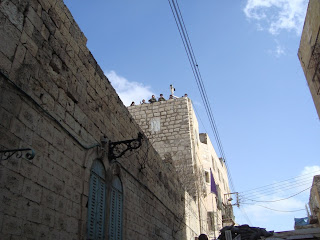



Today a delegation of 190 Spanish politicians, peace activists, media and tourists learned that they were not allowed to get in to the Palestinian Qurtoba School where they were to perform activities for children. The aim of the visit was to have a concert and art workshops for school children that are often traumatized and face settler violence. As the visitors were denied access, like it has been happening to all internationals for 2 months now, the school children came to meet them outside the check point .
A folk band of Spanish musicians from Galicia started playing, people were clapping and waving their hands. Children were singing, some were dancing. Cheezy as it may seem, for these people this was a big moment. "I am so happy. This is really special. I will write about it in my diary", said to me Ishraq, one of the schoolgirls.
In response soldiers mobilized and gathered on top on the neighboring building pointing their M16 at us. But nobody really cared.
Then, as planned there was an art workshop for children, they were drawing their ideas of peace on a huge sheet of paper on the floor. It was all very symbolic. It was also quite an achievement: a real non violent action that showed sincere and deep-from-the-heart solidarity with Palestinians and attracted the media to the movement restriction problem in Hebron (there were a lot of media on the spot).
Tell Rumeida neighborhood has been closed after the 2nd intifada in 2000. What used to be once the main street of Hebron seems now a ghost city. Shops has been closed by military order. Only residents are allowed in. Palestinian are not allowed to drive on the streets, on some they are not allowed to walk. Israeli settlers that live inside Tel Rumeida often attack the Palestinian families, especially the children. Israeli soldiers and police do little to protect them (soldiers' task is to protect the settlers). That is why international presence there is very important: we accompany children to school and document settler violence.
No comments:
Post a Comment